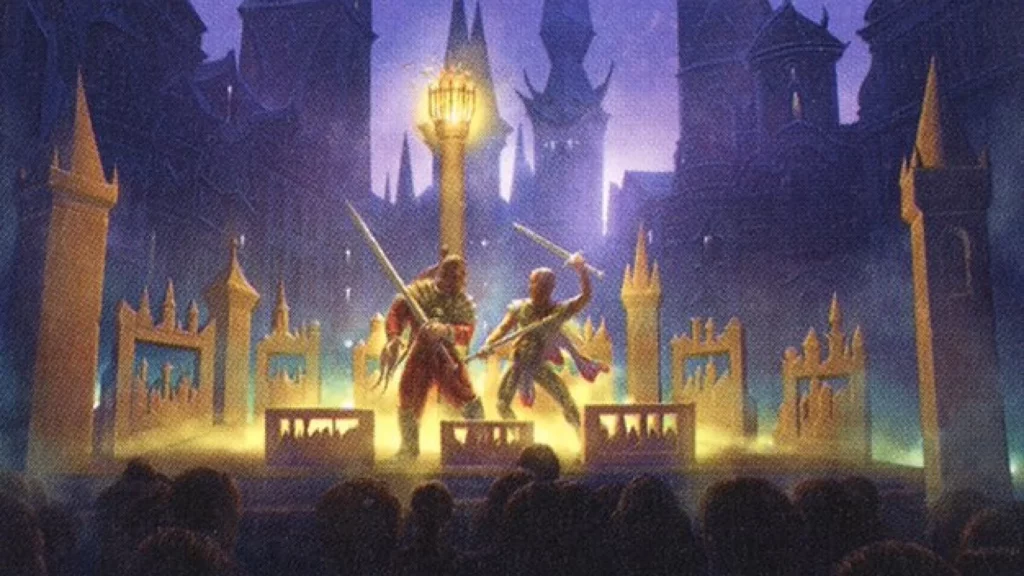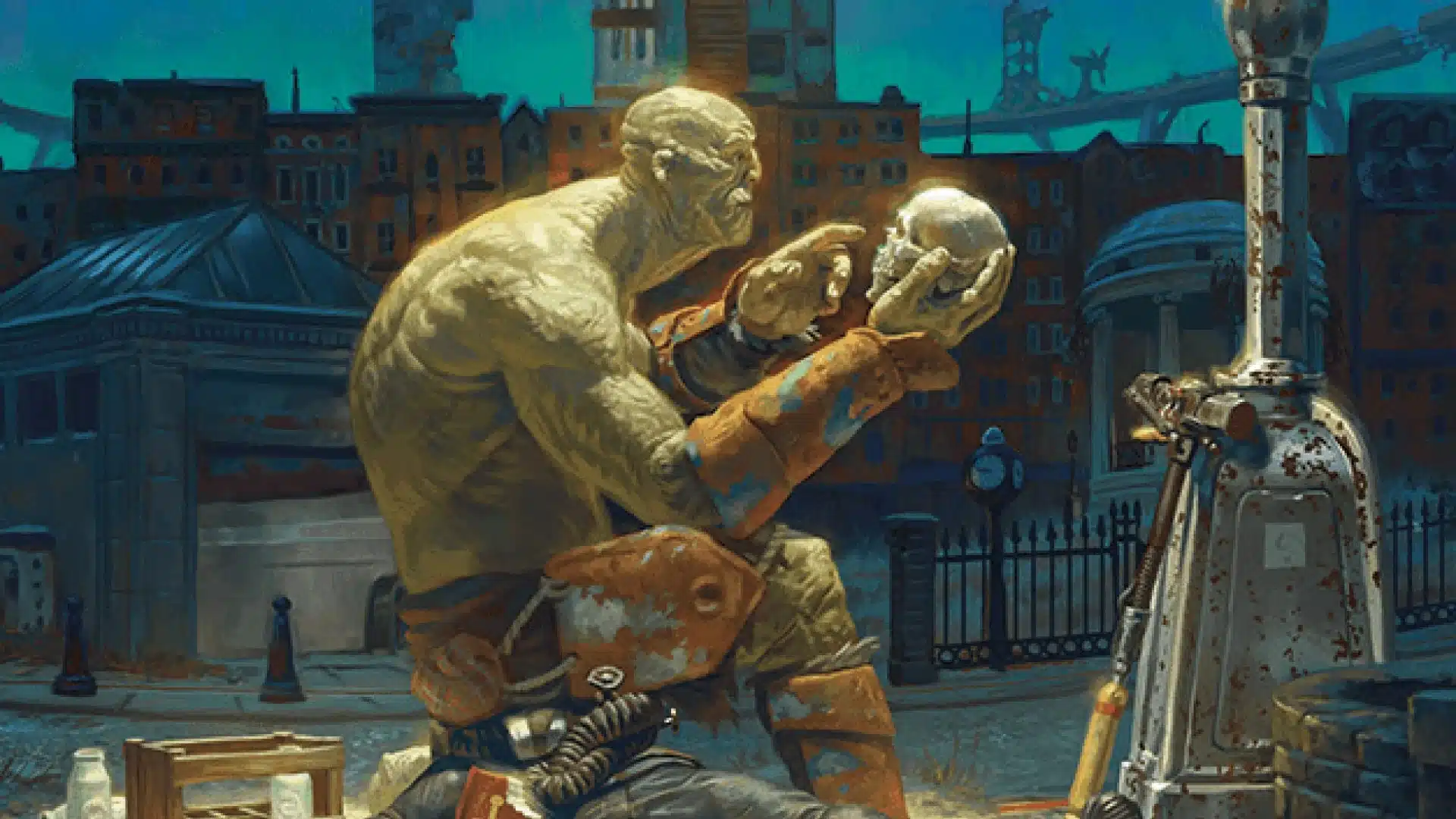We’re deep into the Universes Beyond era now, and players have gotten used to the idea of pretty much anything being converted into a Magic: The Gathering set. The number of IP and artist crossovers the game has seen is past counting at this point. That said, there will always be those who yearn for more. Over the weekend, MTG Head Designer Mark Rosewater answered a question about the possibility of a fully-fledged Shakespeare set for the game.
While this idea might’ve raised eyebrows at one point, in the age of SpongeBob memes on official cards, it’s not out of the question at all. Rosewater was quick to point out the problems with such an expansion. This started a spirited debate among players about the merits of public domain Universes Beyond content. Given Magic’s surprisingly rich literary history, this discussion feels both timely and important at the current juncture.
Much Ado About An MTG Shakespeare Set

“shrubseph: If/When universes beyond Shakespeare or other public domain literature, either as a full set or something smaller like the Dracula cards?
Mark Rosewater: If. The concern is about whether there would be a big enough audience for that property. For example, how many players would be excited to buy a Shakespeare set? There’s definitely an audience, but is it big enough?”
Via Blogatog
This was the post that kicked off the “Is a Shakespeare MTG set viable?” debate. Rosewater immediately latched onto audience size as the key issue here. Older works of public domain literature, Shakespeare etc., don’t tend to command the kinds of fanbases that big multimedia properties like Lord of the Rings and Fallout do. They’re huge parts of our collective media consciousness, certainly. In terms of actually driving the kinds of sales that Wizards wants, however, they’re lacking.
Time and time again, potential audience has come up as a factor in Universes Beyond debates. Those against outside properties coming in have had to contend with irrefutable evidence that players, for the most part, want these things in the game. They want to buy them, and they want to play with them. In this case, the inverse is most likely true. As cool as a set packed with the iconic plots and characters of Shakespeare would be for some, it’s not tapping into the same rich vein of interest.
“Even if their only concern were making people like the game and enjoy it, why would they focus on something with a very niche fanbase instead of something more mainstream? Why do twice the work to please 1% as many people?”
reginakasteen, via Blogatog
Many in the comments of the original post echoed this opinion. Responding to those who suggested other classic literature properties that could be worth adapting, concerns around sales were a recurring argument. Additionally, players raised the point that going “too deep” with sets like these could very easily isolate players.
“Too deep is a problem. Using references that people don’t understand fundamentally clashes with the principle behind using those references.”
raytyger, via Blogatog
Original Kamigawa block is probably the best example of this from Magic’s past, and was duly brought up in the ensuing discussion. The Japanese mythology it explored was rich and varied, but it was also very specific. This meant there wasn’t a huge amount to latch onto for those unfamiliar.
All’s Well That Ends Well?

“People aren’t happy unless their “MTG Lore” is as ubiquitous as SpongeBob and Spider-Man. After all, that’s the audience WoTC has recently decided to cultivate.”
strymon, via Blogatog
On the other side of the fence, many in the comments were quick to defend the idea of a Shakespeare, or other public domain literature, MTG set. Some of this, like strymon’s comment above, was criticism of the current Universes Beyond model. One of the biggest problems Universes Beyond critics have with the initiative is the jarring effect seeing mainstream characters in the game has. Using classic literature instead would likely alleviate this problem, since there’s some cultural distance between the audience and the subject.
There’s plenty of intellectual bias present in this argument, to be sure. The idea that classic literature is inherently more worthy as a subject than popular modern media is deeply flawed. There is an undeniable aesthetic difference at play here, however, that could make the classics more palatable in Magic form.
“Even if “references nobody understands” is a problem, it certainly not one for Universes Beyond. Do you genuinely believe the average Magic player knows jack shit about pre-reboot Doctor Who?”
feyd-rautha-apologist, via Blogatog
Another common argument was that Universes Beyond, in its current form, has already gone to pretty niche places where few fans can follow. The Doctor Who and Fallout Commander decks are both great examples of this, packed with references to obscure material that the average fan won’t get. The upcoming Final Fantasy expansion will likely do the same, to meet the impossible task of covering 16 games in a single set.
Heck, even The Lord of the Rings: Tales of Middle-earth was based on the original books, not the mega-popular film adaptations. There’s plenty of obscure stuff in that set that only readers will appreciate. Despite that, it was one of the best-selling MTG sets of all time. If these products can exist and excel, then there’s little reason other classic literature sets can’t do the same. There are even examples with popular modern adaptations that would be ideal candidates, like Sherlock Holmes.
A Literary Tradition

With such a lively discussion around it, it’s clear that the idea of an MTG Shakespeare set is a contentious one. Interestingly, this controversy exists despite the fact that Magic has been dipping into the literary canon for inspiration for years.
The most obvious example of this is the Welcome to Castle Dracula Secret Lair. Shrubseph referenced it in their original question as an existing example of classic literature in Universes Beyond, and it is the perfect showcase for the idea. Five classic cards were recast as characters from the novel, with artwork evocative of its gothic vibe. These were joined by 18 alternate-art cards in Innistrad: Crimson Vow, each of which did the same. The result was a small tribute to Dracula, not a full set, but still undeniably an interesting experiment.
Going further back, classic Magic is even richer with literature references. Arabian Nights is often jokingly referred to as the first Universes Beyond set, but there is some truth to that. Despite ostensibly being set in-multiverse on Rabiah, the characters and items portrayed are all straight out of 1,001 Nights: a classic of world literature.
On top of that, older sets would often just straight-up recreate literary characters in card form. The Dark’s Frankenstein’s Monster is the clearest example. Older cards used to leverage classic literary quotes as flavor text, too. While not a full set, there are 27 cards that use Shakespeare quotes on them from across Magic history.
Given how far removed Magic is from these points in its history, it’s unclear whether this existing foundation makes a full-on literature set more likely or not. It would be a refreshing change of pace, but it would also be a major financial risk for Wizards.

